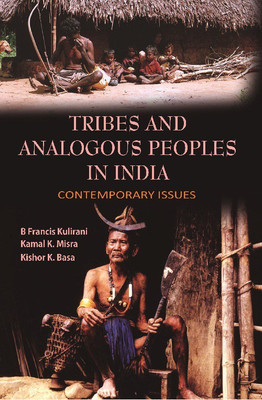Tribes and Analogous People In India : Contemporary Issues(English, Hardcover, B Francis Kulirani, K K Misra, K K Basa)
Quick Overview
Product Price Comparison
About The Book:- The concepts of " Tribe" and " Tribal identity" in Indian context are very complex and contested.The politics of inclusion in and exclusion from 'Scheduled Tribe ' list adds to the din at regional and national levels. The claims as well as preferences of tribes to the attributes of Adivas is in tum equated with ' indigenous people ' also are largely contested. In spite of the lack of national unanimity, the perception of the tribes of India as part' of the world indigenous peoples has gained wider acceptability. The proclaimed welfare policy of 'main streaming' of tribes has met with severe resistance. What constitutes the reality of tribal situation in time and space can only be provided by periodical sound anthropological studies. The papers in this volume deals with-four major themes: Ethnicity and cultural identity of tribes; Endangerment of indigenous languages of tribes ; Issues and perspectives of tribal development in multiple cultural contexts; and Impact of globalization on livelihood systems and occupational patterns of tribes in India. Understanding the dynamics of development among the tribes and communities with analogous socio-cultural and techno-economic dispositions require anthropological approach. Responsible national and regional collaboration of the agencies involved and ensuring informed participation of the communities and peoples concerned in developmental works can alleviate the deprivations as discussed in the presentations. B Francis Kulirani, is former Deputy Director (Cultural) Anthropological Survey of India, Kolkata. Kulirani obtained his MSc degree from the Pune University and Doctoral degree from the University of Calicut. He has 35 years long research career across the various regions of the country and conducted field studie s. He has written/edited ten books and many articles in national/international journals. He was awa:ded Shastri Indo- Canadian Research Fellowship. Kulirani is a member of the International Union of Anthropological and Ethnological Sciences (IUAES) and was a delegate to the 16th World Congress (Kunming, China) and 17th World Congress (Manchester, United Kingdom) of the IUAES. Kulirani is Founder Secretary of the Anthropological Association, Mysore and a Life Member of the Indian National Confederation and Academy of Anthropologists (!NCAA), Kolkata. He is Life Member of the North East India Council of Social Science Research, Shillong and one of the former Presidents. He is member of the Editorial Board of The Indian Journal ofAnthropology, About The Author:- Kamal K . Misra , is Professor of Anthropology at the Central University of Hyderabad. He was educated at Utkal University, Jawaharlal Nehru University and University of Kent at Canterbury. His teaching career spans over 37 years. He had taught at Utkal University, Austin College, Texas (USA), and has been teaching at the Central University of Hyderabad since 1989. He has written/edited 22 volumes and scores of research papers in journals of repute. He was awarded the Commonwealth Academic Staff Fellowship in the UK and the Fulbright Scholar-in-Residence Award in the USA for teaching and research. Dr. Misra was awarded Sarat Chandra Roy Memorial Medal by the Asiatic Society for his contribution to Cultural Anthropology. He was a member of the High Level Committee of the Prime Minister to prepare a report on the status of the Scheduled Tribes of India. He was Director of Indira Gandhi Rashtriya Manav Sangrahalaya (National Museum of Mankind) and Anthropological Survey of India. Kishor K. Basa, is Professor of Anthropology at Utkal University, Orissa, was former Head of the Department and has been teaching archaeology and museum studies since 1980. He was educated in Utkal and Delhi Universities besides having a Ph. D. from University of London, a Commonwealth Post-Doctoral Academic Staff Fellowship at the University of Cambridge and a recipient of the Indo-French Cultural Exchange Fellowship. He was also the Director, Indira Gandhi Rashtriya Manav Sangrahalaya, Bhopal; Indian Museum, Kolkata and the Anthropological Survey of India, Kolkata. Dr Basa was former President, Archaeology Section of Indian History Congress as well as Anthropological and Behavioural Sciences Section of Indian Science Congress. He has excavated the sites of Malikhoja, Harirajpur and Gouranga Patana in Odisha. He is founder editor of the journal Humankind and General Editor of a series on Intangible Cultural Heritage of India. He has edited Archaeology of Orissa, Multiple Heritage: Role of Specialised Museums in India. At present he is the Member Secretary, Indian National Confederation and Academy of Anthropologists. Content:- ’╗┐Contents List of Contributors 9 Foreword 13 Message 17 Preface 23 I INTRODUCTION 1. Anthropological Concerns 27 B. Francis Kulirani, K. K. Misra, K. K. Basa 2. Culture and Identity of Tribes at Cross Roads 36 Dr H. Sudarshan 3. Globalisation and Indian Tribes 42 I. S. Chauhan 4. Para


